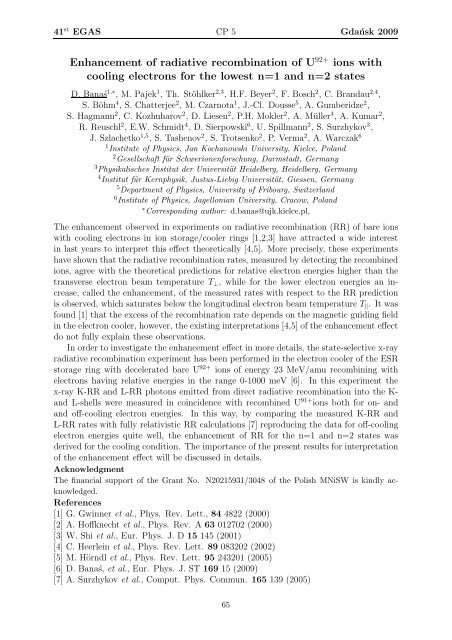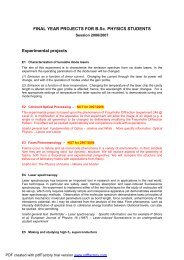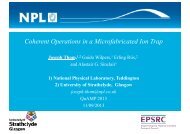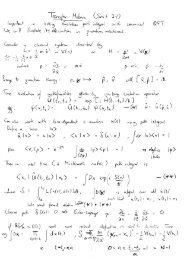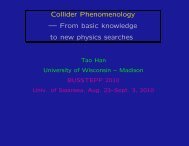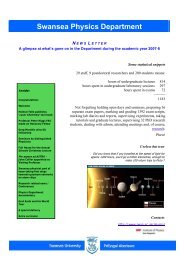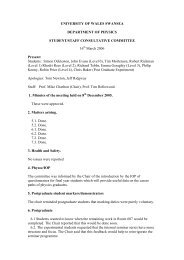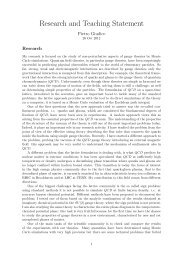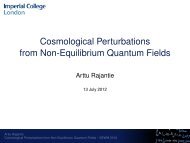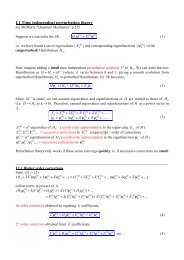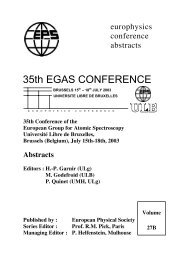EGAS41 - Swansea University
EGAS41 - Swansea University
EGAS41 - Swansea University
You also want an ePaper? Increase the reach of your titles
YUMPU automatically turns print PDFs into web optimized ePapers that Google loves.
41 st EGAS CP 5 Gdańsk 2009<br />
Enhancement of radiative recombination of U 92+ ions with<br />
cooling electrons for the lowest n=1 and n=2 states<br />
D. Banaś 1,∗ , M. Pajek 1 , Th. Stöhlker 2,3 , H.F. Beyer 2 , F. Bosch 2 , C. Brandau 2,4 ,<br />
S. Böhm 4 , S. Chatterjee 2 , M. Czarnota 1 , J.-Cl. Dousse 5 , A. Gumberidze 2 ,<br />
S. Hagmann 2 , C. Kozhuharov 2 , D. Liesen 2 , P.H. Mokler 2 , A. Müller 4 , A. Kumar 2 ,<br />
R. Reuschl 2 , E.W. Schmidt 4 , D. Sierpowski 6 , U. Spillmann 2 , S. Surzhykov 3 ,<br />
J. Szlachetko 1,5 , S. Tashenov 2 , S. Trotsenko 2 , P. Verma 2 , A. Warczak 6<br />
1 Institute of Physics, Jan Kochanowski <strong>University</strong>, Kielce, Poland<br />
2 Gesellschaft für Schwerionenforschung, Darmstadt, Germany<br />
3 Physikalisches Institut der Universität Heidelberg, Heidelberg, Germany<br />
4 Institut für Kernphysik, Justus-Liebig Universität, Giessen, Germany<br />
5 Department of Physics, <strong>University</strong> of Fribourg, Switzerland<br />
6 Institute of Physics, Jagellonian <strong>University</strong>, Cracow, Poland<br />
∗ Corresponding author: d.banas@ujk.kielce.pl,<br />
The enhancement observed in experiments on radiative recombination (RR) of bare ions<br />
with cooling electrons in ion storage/cooler rings [1,2,3] have attracted a wide interest<br />
in last years to interpret this effect theoretically [4,5]. More precisely, these experiments<br />
have shown that the radiative recombination rates, measured by detecting the recombined<br />
ions, agree with the theoretical predictions for relative electron energies higher than the<br />
transverse electron beam temperature T ⊥ , while for the lower electron energies an increase,<br />
called the enhancement, of the measured rates with respect to the RR prediction<br />
is observed, which saturates below the longitudinal electron beam temperature T ‖ . It was<br />
found [1] that the excess of the recombination rate depends on the magnetic guiding field<br />
in the electron cooler, however, the existing interpretations [4,5] of the enhancement effect<br />
do not fully explain these observations.<br />
In order to investigate the enhancement effect in more details, the state-selective x-ray<br />
radiative recombination experiment has been performed in the electron cooler of the ESR<br />
storage ring with decelerated bare U 92+ ions of energy 23 MeV/amu recombining with<br />
electrons having relative energies in the range 0-1000 meV [6]. In this experiment the<br />
x-ray K-RR and L-RR photons emitted from direct radiative recombination into the K-<br />
and L-shells were measured in coincidence with recombined U 91+ ions both for on- and<br />
and off-cooling electron energies. In this way, by comparing the measured K-RR and<br />
L-RR rates with fully relativistic RR calculations [7] reproducing the data for off-cooling<br />
electron energies quite well, the enhancement of RR for the n=1 and n=2 states was<br />
derived for the cooling condition. The importance of the present results for interpretation<br />
of the enhancement effect will be discussed in details.<br />
Acknowledgment<br />
The financial support of the Grant No. N20215931/3048 of the Polish MNiSW is kindly acknowledged.<br />
References<br />
[1] G. Gwinner et al., Phys. Rev. Lett., 84 4822 (2000)<br />
[2] A. Hoffknecht et al., Phys. Rev. A 63 012702 (2000)<br />
[3] W. Shi et al., Eur. Phys. J. D 15 145 (2001)<br />
[4] C. Heerlein et al., Phys. Rev. Lett. 89 083202 (2002)<br />
[5] M. Hörndl et al., Phys. Rev. Lett. 95 243201 (2005)<br />
[6] D. Banaś, et al., Eur. Phys. J. ST 169 15 (2009)<br />
[7] A. Surzhykov et al., Comput. Phys. Commun. 165 139 (2005)<br />
65


